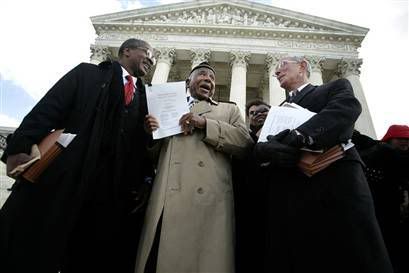
Harvard University Law Professor Charles Ogletree leads fight for restitution for slavery.
When a corporation or unit of American government acknowledges that it is still using buildings that were built with slave labor, is an apology enough, or is restitution legally required?
The New York Times reports today,
The University of Virginia’s board marked the birthday of Thomas Jefferson, its founder, with an apology for its use of slave labor from 1819 to 1865. The board of visitors unanimously passed an apology resolution on April 13, the 264th anniversary of Jefferson’s birth, but did not announce the action until Tuesday. The measure was inspired by the Virginia Legislature, which passed a resolution in February expressing its “profound regret” for the state’s role in slavery. Slaves in Virginia helped build some of the first buildings at the university, which opened in 1825, and the university continued to use slave labor into the 1860s. NYT
MSNBC reported last year,
Advocates who say black Americans should be compensated for slavery and its Jim Crow aftermath are quietly chalking up victories and gaining momentum.
Fueled by the work of scholars and lawyers, their campaign has morphed in recent years from a fringe-group rallying cry into sophisticated, mainstream movement. Most recently, a pair of churches apologized for their part in the slave trade, and one is studying ways to repay black church members. . .
“This matter is growing in significance rather than declining,” said Charles Ogletree, a Harvard law professor and a leading reparations activist. “It has more vigor and vitality in the 21st century than it’s had in the history of the reparations movement.” MSNBC;
New Dream Team Seeks Reparations (2000)
One of the traditional American legal theories being tested in the area of reparations is the theory of "unjust enrichment."
Nolo.Com defines "unjust enrichment" as:
A legal doctrine stating that if a person receives money or other property through no effort of his own, at the expense of another, the recipient should return the property to the rightful owner, even if the property was not obtained illegally. Most courts will order that the property be returned if the party who has suffered the loss brings a lawsuit.Nolo.Com (Also see Legal Affairs.)
For example, the Liggett cigarette manufacturing group, headquartered in Durham, North Carolina since before the Civil War, reported in its 2005 financial statement that, "Liggett has been served in three reparations actions brought by descendants of slaves. Plaintiffs in these actions claim that defendants, including Liggett, profited from the use of slave labor. Seven additional cases have been filed in California, Illinois and New York. Liggett is a named defendant in only one of these additional cases, but has not been served." Secutities and Exchange Commission

Harvard Professor Charles Ogletree (left) in front of US Supreme Court.
Law professors including Afred Brophy, who posts at the Ratio Juris blog are teaching reparations theory at American law schools.
Robert K. Fullinwider of the Institute for Philosophy and Public Policy at the University of Maryland said in 2002,
The argument for reparations starts from a hallowed but vague principle: as a matter of justice, past wrongs should be righted. If we concede now that American institutions of slavery and racial segregation were grievous wrongs, that concession puts us over the initial threshold for considering reparations. But where do we go from there?
Many paths beckon – but some of them lead to dead ends and others to places we shouldn’t go. How, then, do we navigate this difficult terrain? One model to keep in mind is the reparations program enacted in the Civil Liberties Act of 1988. In that Act, Congress apologized to Japanese Americans who had been interned during World War II and, acknowledging the deprivations they suffered, tendered to each internee (or his heirs) $20,000 in partial compensation.
Indeed, it was this Act of Congress that ignited the current ferment among African-Americans to push their own reparations claims back onto the public agenda. In each session of Congress since 1989, Representative John Conyers of Michigan has introduced a bill to create a commission – like the Commission on Wartime Relocation and Internment of Civilians that preceded the 1988 Civil Liberties Act – to study the question of reparations for slavery and segregation. This proposed legislation has been the focal point of a growing literature aimed both at mobilizing the African American community and laying the basis for legal and political initiatives. Were it not for the 1988 Act, we wouldn’t be here today. Robert K. Fullinwider
Anthony J. Sebok, a professor of law at the Brooklyn Law School, addressed the theory of unjust enrichment in an an article in a 2003 article:
The question of whether and how to sue in private law for the injuries caused by slavery in the United States is important from both a social and legal perspective. Here, I am going to examine a very small and specific part of the question. My advice to those who wish to address the question of historic injustice through tort suits is to move forward very carefully, and therefore I will risk boring you by picking a topic that might strike you as unbelievably tangential to the hot-button issues of reparations. I am going to talk to you about—I hate to say it—the separation of law and equity.
Discussing law and equity is important because the root theory for legal liability in the American slavery cases, and one of the two root theories for liability in the Holocaust slave labor cases, is a claim of “unjust enrichment.”
It is very interesting that out of such an obscure, almost forgotten part of American private law, such a powerful new legal movement has been born. In this symposium others have written about other theories of recovery and I do not mean to suggest that unjust enrichment is the only approach. But, it was an element of the Holocaust litigation—not the only one, but a large one. It is, in fact, the foundation of the most recent lawsuit filed in federal court in Brooklyn. It is thus very important to understand what unjust enrichment means . . .
Unjust enrichment is an interesting example of a cause of action that was formed on the borderline between a claim for damages and a claim for an injunction. Originally, when early courts consistently held that either a claim for damages or equity would preclude the other, the problem arose of how to bring a claim involving an intangible form of property. It was clear that if one held legal title to a thing and could show that one had been physically dispossessed of it, one could get an injunction to have it returned. It was also clear that if one had legal title to a thing, and that thing was injured, damages were recoverable. Anthony J. Sebok
Some US courts have not been kind to suits requesting reparations for slavery thus far.
But, according to the New Standard,
A proposal now before Congress could either begin an unprecedented examination of institutional racism in the United States or once again mark how far the government is from confronting historical scars.
The plight of H.R. 40, which would establish a Commission to Study Reparation Proposals for African-Americans, encapsulates the controversy over how, or whether, the US government should deal with the legacy of slavery.
Re-introducing the bill in the House of Representatives, John Conyers (D–Michigan) remarked in January that despite the resistance the legislation has encountered – it has never advanced to a floor vote, though it has resurfaced each year since 1989 – its mission is relatively modest. H.R. 40 would not authorize compensation for descendants of slaves. Rather, it would merely require Congress to consider the issue in an effort "to further a national dialogue on the plight of African Americans in the context of slavery, Jim Crow, and other legally sanctioned discrimination."
H.R. 40 would establish a commission, jointly appointed by the president and Congress, to "acknowledge the fundamental injustice, cruelty, brutality, and inhumanity of slavery in the United States," and examine whether remedies are warranted for any "lingering effects" of slavery on blacks today.
The bill is modeled after the restitution process for victims of the mass incarceration of Japanese-Americans during World War II. That initiative involved a similar congressional study and eventually, official payouts to surviving detainees under the Civil Liberties Act of 1988. NewStandard.Com
As Kaimipono D. Wenger said in remarks prepared for the 2006 Taking Reparations Seriously conference at Thomas Jefferson School of Law,
Slavery reparations present special challenges to the rule of law. Reparations potentially involve the transfer of large amounts of money to a class of people – descendants of an original harmed group – who are seeking payment over a century after the initial harm. In addition, the cost of this transfer will necessarily fall on at least some parties who are not morally culpable for the original harm.
These aspects of reparations raise complex concerns relating to the rule of law, which should be addressed before any restitution is possible. While these concerns are certainly reasonable, examination of the broader rule of law concerns shows that the greatest offense to the rule of law would arise from not paying reparations. . .
Societal expression of remorse for rule of law breaches – coupled with concrete steps to ameliorate the harm – is a necessary step in repairing the damage done by slavery to the rule of law. Reparations show societal will to set things right following the removal of the rule of law protections for Blacks. They are also a way of affirming that such breach of the rule of law will not recur. Thus, payment of reparations allows society to move forward, and encourages disadvantaged groups to regain confidence in the rule of law. Not only are reparations consistent with the rule of law, they are in fact a product of the rule of law. Concurring Opinion
Findlaw.Com Slavery Reparations Reading List








6 comments:
Frankly, although at the time, you were using it to describe the effects of perceived racism, I think that a Reparations blog would be a good idea (although http://www.reparationscentral.com/index.html seems like a reasonable resource for African-American reparations).
To briefly address a few of your points:
"When a corporation or unit of American government acknowledges that it is still using buildings that were built with slave labor, is an apology enough, or is restitution legally required?"
Of course an apology isn't enough. In my mind, the question isn't as much "Should there be reparations?" as "How should reparations be carried out, and for what?"
I support H.R. 40, but I wonder if it doesn't go far enough. While it covers the federal component of reparations for African-Americans fairly well, it doesn't touch the genocide and enslavement of Native Americans.
In my mind, reparations for Native Americans are an even larger issue for the U.S. than reparations for African-Americans. The U.S. (and its predecessors) had direct and deliberate genocidal policies towards Native Americans; in most cases, they had less direct (though no less deliberate) policies aiding other colonial powers' genocide towards multiple African and Caribbean peoples.
To me, this is the real problem with reparations- if the U.S. chose to make it a priority, I think that (over a lot of time, with a lot of effort), a fair amount of reparations could be paid to the descendants of African and Caribbean slaves. We'd just have to consider it more important than invading countries that haven't attacked us for a century or so, and have a moderate increase to taxes. I'm not certain that it's possible to give reasonable reparations to Native Americans (both ones descended from slaves, and the rest) (or their descendants).
@ Zimbel:
Since law school, I've felt we needed an all-out push, like the Civil Rights Movement, to develop the legal strategies and political environment to provide restitution for slavery. (I prefer the word "restitution" because it is a concept that is much more familiar to American law, as opposed to the reparations term, which is identified almost exclusively with slavery, which implies that restitution to Blacks is somehow a foreign concept to America law. We want the same thing that anyone else would want under the same circumstances.
I agree with you that a reparations blog would be a good idea, although I wouldn't try to make it an all-Black blog, like Kos has tried to make his crashing movement an all-white movement. Reparations needs to be a broadbased movement.
At the same time, the Afrosphere should have a restitution blog that is a collaboration between the Afrosphere blogs, and this blog should develop the Afrosphere's position and advocacy on restitution.
Native Americans need a political solution that compensates them as well.
I can tell you that 18 months ago I was an ardent believer in the idea that our fixation on reparations only served to deter us from more meaningful pursuits. I'm not yet to a point of placing this issue in my political sights, but...I'm more open to this today than I was yesterday.
Thank you.
For a long time, I believed that the it was just as unrealistic to expect reparations as it was to expect that a woman or Black man would be elected president of the United States.
Now, I believe that all three of these goals seem more realistic and we need to reassess our attitude towards restitution. If you or I spray-painted our names on the buildings at the University of Virginia that were built by slaves, we would almost certainly be asked to make restitution for the harm done. It's only fair.
If restitution is a common remedy in trivial cases, ought it not also be considered in serious cases? Is there something about being Black that makes us inherently unworthy of remedies that are common in other contexts?
"Native Americans need a political solution that compensates them as well."
The problem is that the debt seems so large. I mean, how (who) do you compensate for wiping out a nation? (By the way, this is also a very relevant African reparations question between certain African groups and the "Colonial powers".) If there are any descendants, how would you identify them? And how would you compensate them for the theft of their land alone (never mind the slavery, massacres, forced re-locations, etc)?
I came up with a few ideas; some of these are stolen from ideas for African-American reparations:
1) Grant the 49 tribes with the highest population a full Senator. Grant 1 more Senator to all the remaining tribes combined. Perhaps these new seats should be limited to, say 400 years. That's right - nothing gets through the Senate for centuries against unified Native opposition.
2) Seize all real property, and re-distribute it to those of Native descent. To be polite to those who thought they owned the land they live on, allow such people to rent it for a fair price for some limited term (1 century?), after which time the owner(s) could do what they like with it.
3) Offer, say, 20 states, each of which would be made up of one or more reservations.
4) Grant free high-quality medical care (yep, with the doctors, nurses, drugs, and hospitals to go with it), fully funded schools with extremely small class sizes, and a periodic sizable check which would in and of itself keep every Native American living on a reservation out of poverty - forever.
Nice post. You make very good points. I agree something should be done, both for descendants of slaves and Native Americans. My biggest worry is the financial issue you bring up. Who will pay for this? Taxpayers? Will people who are not descendants of slave owners be forced to pay? How about descendants of slave owners who didn't personally see a penny of that enrichment? Will black people ironically also be taxed more to fund this? I don't believe for a minute that our government will stop waging war and wasting money to free up money for reparations/restitution. More likely the money will be siphoned from school and welfare funds instead. Like I said, something should be done, but is this really the best way to do it?
One more point - the money, if paid out to individuals, may or may not do permanent good. Perhaps we should look into restitution in the form of scholarships or something of that nature.
Post a Comment